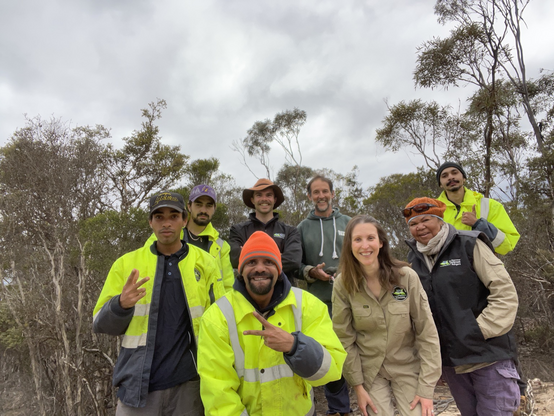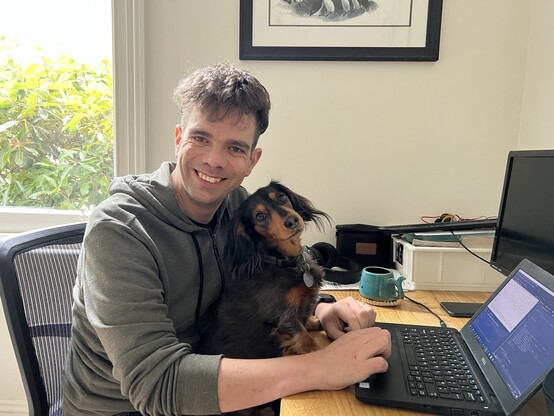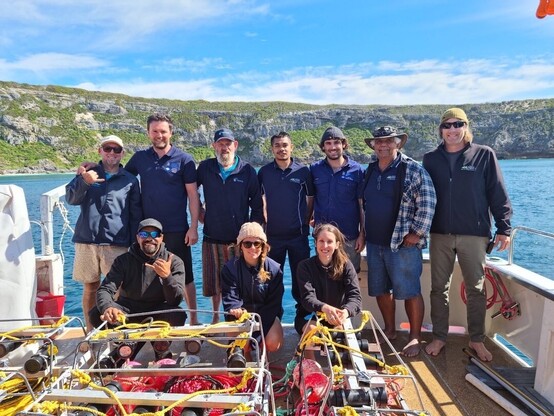SeabirdSentinel · @SeabirdSentinel
54 followers · 80 posts · Server climatejustice.socialAnother day bashing through extremely dense Melaleuca in search of #malleefowl with #EsperanceTjaltjraak #IndigenousRangers. After getting whipped in the face by branches for 5 hrs, Im not able to include any quotes from the team because they all included curse words 🤬 (and a lot of grunting!). Good thing no one needed to record the “sounds of the bush” 🤣🤣🤣 And no, we didn’t see any birds 🙄 Thankfully, these hard-earned data are part of a new MSc #student #research project in collaboration with #RMIT University - stay tuned for exciting updates!
#CaringForCountry #ProtectWhatYouLove #ThreatenedSpecies #TeamWork #collaboration #AdriftLab #drones #SateliteImagery @AdriftLab
#malleefowl #esperancetjaltjraak #indigenousrangers #student #research #rmit #caringforcountry #protectwhatyoulove #threatenedspecies #Teamwork #collaboration #adriftlab #drones #sateliteimagery
SeabirdSentinel · @SeabirdSentinel
82 followers · 60 posts · Server climatejustice.socialThis week our ETNTAC #IndigenousRangers are supporting the 2023 #BushBlitz event in #Esperance. I was fortunate to spend the day with this epic human ⬇️ totally in awe of his #dreamtime stories & the ID skills of the trapdoor #spider expert #AdriftLab #NewSpecies #CaringForCountry @adriftlab
#indigenousrangers #bushblitz #esperance #Dreamtime #Spider #adriftlab #newspecies #caringforcountry
SeabirdSentinel · @SeabirdSentinel
79 followers · 57 posts · Server climatejustice.social🎉New @AdriftLab paper 🎉 in ICES Journal of Marine Science!! Download it for free (#OpenAccess) HERE ➡️ https://academic.oup.com/icesjms/advance-article/doi/10.1093/icesjms/fsad048/7083385
So, what did we find? Well, in young #seabirds, body mass influences the likelihood of survival in the critical period between nest departure & recruitment to the breeding population. For this study, we measured #shearwater chicks to determine how body condition changed over 13 years (an incredible long-term dataset!).
During 2010–2022, we found chick body mass & 3 measures of size (eg. wing length) declined by up to 0.23 mm/yr with body mass declining by 16 g/yr 📏📉😢
In the 1st photo, a healthy chick is shown on the LEFT while an undersized chick which we more commonly observed is shown on the RIGHT.
Overall, the number of chicks fledging (leaving the nest) at <400 g has increased sharply in recent years (see photo 2), meaning significant numbers of birds are unlikely to survive after departing the island
This paper highlights the value of #LongTermMonitoring & critical role #philanthropy has played: literally NONE of this world-class science would have been possible without support from generous donors, especially Detached Hobart - we are forever grateful! 😍🐦💙 Huge thanks to Justin Gilligan for providing the stunning (yet sad) 📸, they made all the difference to this paper! Finally, a massive thanks to @nhmscience and Esperance Tjaltjraak for supporting our team 🙏
#AdriftLab #Morphometrics #LordHoweIsland #OceanHealth #BioIndicator #TippingPoint #BiodiversityCrisis #Sentinel @TheLabAndField
#openaccess #Seabirds #shearwater #longtermmonitoring #philanthropy #adriftlab #Morphometrics #lordhoweisland #oceanhealth #bioindicator #tippingpoint #biodiversitycrisis #sentinel
SeabirdSentinel · @SeabirdSentinel
78 followers · 52 posts · Server climatejustice.social#AdriftLab science on the front page of The Guardian UK - incredible work Hayley and team 🎉 #seabirds #microplastics #SublethalEffects #Plasticosis @AdriftLab https://www.theguardian.com/environment/2023/mar/03/plasticosis-new-disease-caused-by-plastics-discovered-in-seabirds
#adriftlab #Seabirds #microPlastics #sublethaleffects #plasticosis
SeabirdSentinel · @SeabirdSentinel
76 followers · 42 posts · Server climatejustice.socialCelebrating the fact we resubmitted TWO #AdriftLab papers in the same week - what a team 🤩🎉 #seabirds #plastics #DachshundsOfMastodon @AdriftLab
#adriftlab #Seabirds #plastics #dachshundsofmastodon
SeabirdSentinel · @SeabirdSentinel
55 followers · 20 posts · Server climatejustice.socialDAY 6 (#AdriftLab’s last update from the #NullaborPlains): after 4 days of driving, today the #SausageExpress arrived in Esperance!
For our final post, we reflect on the paucity of #wildlife observed during 40 hr of driving across 3580 km, four states, and diversity of habitats (occasionally at dawn). While we saw plenty of magpies and crows (and two wedge-tailed eagles 🦅), no emus, reptiles or mammals were recorded (with the exception of 2 wallabies early this morning, plus 2 road-kill foxes and a rabbit - the latter two are invasive species in AUS). With the exception of a swarm of yellow grasshoppers (near Eucla), our windscreen remained remarkably clean.
#Australia is among the top seven countries worldwide responsible for 60% of the world’s #BiodiversityLoss between 1996 and 2008. There’s much we can and should be doing. But sadly, Australia ranks second worst of 109 countries when it comes to biodiversity status and financial investment in conservation programs.
As first-time visitors to much of the land we crossed this week (essentially, as tourists) the lack of wildlife was notable, as was the frequently burnt vegetation (especially around Balladonia and Norseman 🥺) #bushfire
When you travel across these special places, carefully consider your footprint, the deep history of place, and the desperate need for education and action on environmental issues. We’re all in this together.
#BiodiversityCrisis #InsectApocalyps #ClimateEmergency #ThoughtfulTourism
#adriftlab #nullaborplains #sausageexpress #wildlife #australia #biodiversityloss #bushfire #biodiversitycrisis #insectapocalyps #ClimateEmergency #thoughtfultourism
SeabirdSentinel · @SeabirdSentinel
16 followers · 3 posts · Server climatejustice.socialTWO #AdriftLab student papers ⭐️ACCEPTED⭐️ for publication in only TWO days. Both are first-ever, first-author papers for our recent graduates: Bianca (Hon) & Karli (MSc) 🎉
Bianca & Karli are named on both papers (in high impact, interdisciplinary journals). That’s because, rather that publishing separately, these powerhouse #WomenInSTEM opted to support one another’s projects & get TWO papers out of the process 🥰👍🤩
Stay tuned for brilliant new science on #microplastics and #nanoplastics in #Tasmanian #shorebirds and #seabirds
#adriftlab #womeninstem #microPlastics #nanoplastics #tasmanian #shorebirds #Seabirds #Teamwork #ecrs #collaboration #goodsciencegoodpeople
SeabirdSentinel · @SeabirdSentinel
16 followers · 2 posts · Server climatejustice.socialThe annual #AdriftLab writing workshop with @TheLabAndField has wrapped. As usual, it featured Tasmania’s unpredictable ‘summer’ weather, vast amounts of tea & R coding and our faithful cheer squad (science-dogs). This year was remarkable: in a week we finished THREE new papers (🤩😮💨) reflecting datasets we’d each been passionate or worried about for many years. Amazing to bring these ideas to life!
SeabirdSentinel · @SeabirdSentinel
16 followers · 1 posts · Server climatejustice.socialManaged to finally log back into this account. Exciting Mastodon ‘toot’ to kick things off: last week #AdriftLab sailed across the #Recherche Archipelago to #SalisburyIsland. We didn’t find any #seabirds, but were rewarded with spectacular views of a remote, untouched paradise. We documented #CulturalArtefacts dating back 15,000 years from when the island was still connected to mainland Australia! Grateful to our INCREDIBLE team of #IndigenousRangers, UWA, the National Environmental Science Program & Our Marine Parks Grant for funding this expedition.
#adriftlab #recherche #salisburyisland #Seabirds #culturalartefacts #indigenousrangers







